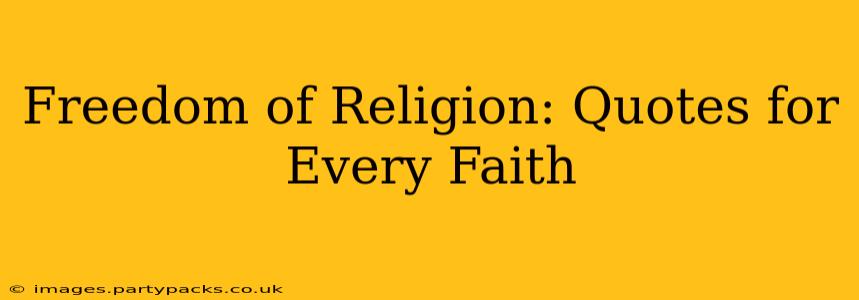Freedom of religion, the right to practice one's faith without coercion or discrimination, is a cornerstone of many societies and a deeply held value for billions worldwide. This fundamental human right allows individuals to worship (or not worship), express their beliefs, and live according to their conscience. This post explores this vital freedom through powerful quotes from diverse religious and philosophical traditions, highlighting the universality of this ideal and its importance in fostering peace and understanding.
What is Freedom of Religion?
Before diving into the quotes, let's define what freedom of religion truly encompasses. It's not simply the liberty to attend services or observe holidays. It's a much broader concept encompassing:
- The right to choose one's belief system: This includes the freedom to change one's religion, become an atheist or agnostic, or hold no religious beliefs at all.
- The right to practice one's religion: This encompasses the freedom to worship, pray, observe religious holidays, and teach one's religious beliefs.
- The right to express one's religious beliefs: This includes the freedom to speak, write, and act according to one's religious convictions, within the bounds of the law.
- The right to be free from discrimination: This means protection against discrimination based on one's religious beliefs or practices in areas like employment, housing, and education.
Inspiring Quotes on Freedom of Religion: A Multifaith Perspective
The following quotes, drawn from various faiths and philosophies, illustrate the profound and universal importance of religious freedom:
Christianity:
- "Blessed are the peacemakers, for they will be called children of God." - Matthew 5:9 (NIV) This emphasizes the importance of peaceful coexistence and mutual respect, essential for ensuring religious freedom.
Islam:
- "Let there be no compulsion in [acceptance of] the religion." - Quran 2:256 This verse explicitly prohibits forced conversion, highlighting the Islamic principle of religious freedom.
Judaism:
- "Justice, justice shall you pursue." - Deuteronomy 16:20 While not explicitly about religious freedom, this emphasizes the importance of fair treatment for all, which is crucial for protecting religious minorities.
Hinduism:
- "Truth is one, sages call it by various names." - Rigveda This reflects the Hindu belief in the unity of all religions, suggesting tolerance and respect for diverse beliefs.
Buddhism:
- "The essence of Buddhism is the principle of compassion and tolerance." - The Dalai Lama This emphasizes the Buddhist emphasis on kindness, empathy, and acceptance – essential elements in promoting religious freedom.
Secular Humanism:
- "I disapprove of what you say, but I will defend to the death your right to say it." - Evelyn Beatrice Hall (paraphrasing Voltaire) This statement, although not directly from a religious text, champions the fundamental principle of freedom of expression, which is crucial to religious freedom.
Frequently Asked Questions (FAQs)
What are the challenges to religious freedom today?
Challenges to religious freedom are multifaceted and vary geographically. They include government restrictions on religious practice, persecution of religious minorities, discrimination in employment and housing, and societal prejudice against certain religious groups. Conflicts and tensions between different religious communities also pose a significant challenge.
How can we protect religious freedom?
Protecting religious freedom requires a multi-pronged approach. This includes enacting and enforcing laws that guarantee religious freedom, promoting intercultural dialogue and understanding, combating religious discrimination through education and advocacy, and fostering respect and tolerance among different religious communities. Active citizenship and engagement in democratic processes are also vital.
Is religious freedom a universal human right?
Yes, religious freedom is widely recognized as a fundamental human right, enshrined in international human rights instruments like the Universal Declaration of Human Rights and the International Covenant on Civil and Political Rights. However, the realization of this right remains a global challenge.
Conclusion
Freedom of religion is not merely a legal right; it is a moral imperative. The quotes presented here, drawn from diverse faith traditions and philosophies, illustrate the universality of this ideal. By embracing tolerance, understanding, and respect for differing beliefs, we can create a world where everyone can freely practice their faith or lack thereof, without fear of persecution or discrimination. The ongoing struggle to protect and promote religious freedom requires the collective effort of individuals, communities, and governments alike.

